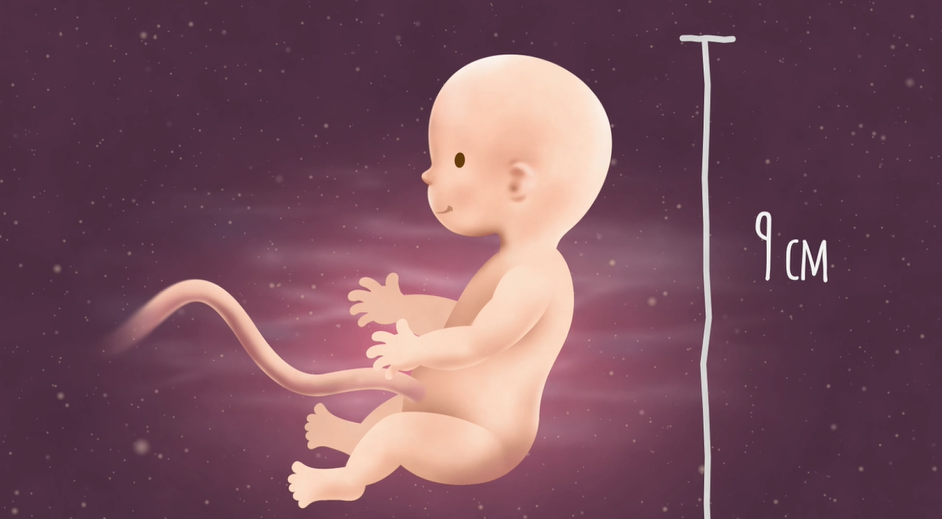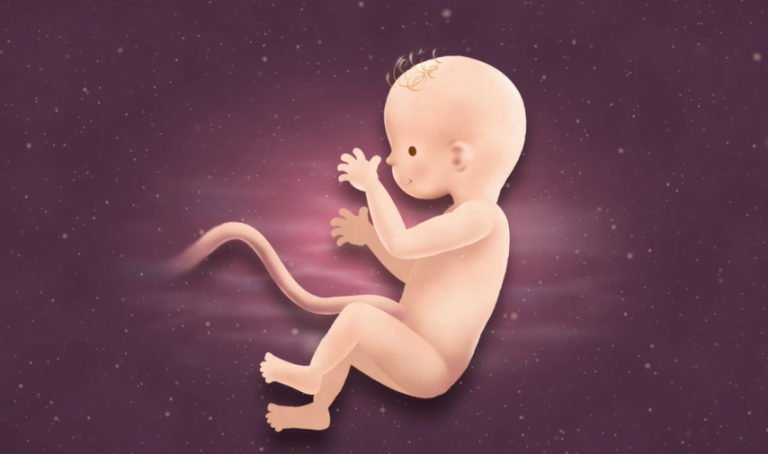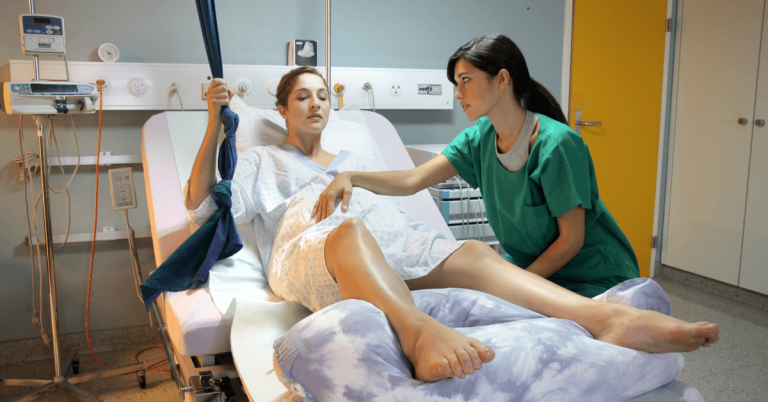As time slips through your fingers, you have reached the fourteenth week of pregnancy. You have left the three-month mark behind and have entered what is generally accepted as the best period in pregnancy. The second trimester is often called the honeymoon of pregnancy. The riskiest period is over, morning sickness has reduced, and you will soon reach the moment when you will feel your baby. We have researched for you what awaits you and your baby this week.
Your Baby at Fourteen Weeks
As the days pass and you have started enjoying pregnancy, your baby is not sitting idle either. He is rapidly growing and developing. He is no longer a little bean, and you have probably seen a real human baby at your last check-up. What changes does a fourteen-week-old foetus go through? Let’s examine this together.
How Big is Your Baby at Fourteen Weeks?
As your baby is growing much faster now, he has almost doubled in size since last week. You surely wonder what that exactly means. At fourteen weeks, he is about the size of a peach. You can find the details in the table below:
| Gestational Age | Weight | Length |
| 14th week | 45−50 g | 8.5−9.5 cm |
These values are averages and may vary from baby to baby due to differences in the moment of fertilisation, which cannot be determined exactly. If fertilisation occurred later than expected, your baby’s values might be lower. Only your doctor can tell you whether there is cause for concern or not.
Development of the Organ Systems and New Skills
Your baby, who started life as a single cell, now has a human appearance. His organs and related systems are also developing rapidly. Let us look at these developments in detail.
- The Nervous System
The spinal cord develops along with the brain. By the end of the fourteenth week, your baby’s spinal cord almost fills the entire spinal cavity. The connections between the brain and nerves are strengthened via the myelin sheath surrounding the nerve cells. Your baby is now moving his facial muscles and is displaying facial expressions, even though you probably haven’t seen this yet.
- The Circulatory System
The placenta, which is almost completed, manages the blood circulation between the baby and the mother. Necessary nutrients and oxygen in the mother’s blood are carried to the baby, while waste and carbon dioxide from the baby are disposed of via the mother.
- The Digestive System
In the fourteenth week of pregnancy, the liver starts converting the nutrition delivered by the mother into nutrients used by the baby. Taking care of what you eat is crucial to give your baby the right nutrition to grow.
- The Respiratory System
Your baby, who started practising breathing the previous week, continues this activity this week. He has already begun to prepare for the postpartum period.
- The Musculoskeletal System
Your little one’s spine was curled inward previously. It now begins to straighten. His weight increases as the muscles and bones develop and strengthen. His arms and legs lengthen, and his movements become more consistent. While the number of reflexive movements decreases, the number of voluntary movements increases.
- The Urinary System
Your fourteen-week-old baby started peeing in the previous weeks. This means that the kidneys work, and the excretory system begins to function.
- The Reproductive System
The genitals almost completed their development in the thirteenth week. You may have been eagerly waiting to learn whether your baby is a girl or a boy. If you are lucky, you will be able to get the answer this week. However, since the spine is just starting to straighten, it can still be difficult to see the gender on the ultrasound. Your doctor may prefer to wait a little longer to be certain.
- The Endocrine and Immune System
Last week, the bone marrow started to produce white blood cells. This week, the spleen, which filters out old or abnormal red blood cells, begins to fulfil its task. In addition, the thyroid gland begins to work and produce hormones.
Your Baby’s Movements at Fourteen Weeks
As your baby grows and his bones and muscles get stronger, the intensity of his movements increases. His facial features are quite prominent, so you may be able to see your baby’s facial expressions on the ultrasound image. He can now put his hand in his mouth and suck it. He may also love doing somersaults and kicks in the womb. You may hope you will feel your fourteen-week-old baby’s movements. However, it is quite unlikely for a first-time mom to feel them already. Nevertheless, second-time mothers often say they can feel some movements in the fourteenth week, as they know what it feels like.
A Fourteen-Week-Old Foetus’s Sense Organs
The development of your baby’s sense organs is intricately linked with that of his brain. As the brain develops, the sense organs start working more accurately. So, what is the status of a fourteen-week-old foetus’s sensory organs? Let’s have a look.
- The Eyes and the Sense of Sight
The eye sockets, which first formed on the sides of your baby’s head, gradually move to their proper position. The eyes move closer to each other. But your baby will not open his eyes yet.
- The Ears and the Sense of Hearing
Your baby becomes aware of the outside world via the sounds he hears and the light he perceives. In the fourteenth week, the bones in the inner part of the ear begin to harden. After this development, your baby will finally start to hear sounds.
- The Skin and the Sense of Touch
Your baby’s lanugo hairs develop, together with his eyebrows and eyelashes. The lanugo hairs keep your baby warm until the fat layer forms under the skin. The sense of touch is one of the earliest senses. For example, your baby reflexively moves away when you press your belly. This will become clearer over time, and you will feel this movement soon.
- The Tongue and the Sense of Taste
Your baby’s sense of taste began to develop the previous week and will continue to develop this week. He tastes the amniotic fluid he swallows more clearly now.
- The Nose and the Sense of Smell
When you look at your baby’s profile, you can see that his nose is even more prominent this week. Along with his sense of taste, his sense of smell develops. He not only tastes but also smells the amniotic fluid he swallows.
How Many Months is Your baby at Fourteen Weeks?
Pregnancy is a period of nine months and ten days, corresponding to forty weeks. Although we are used to expressing this period in months, your doctor will talk about weeks. So, how can you convert the number of weeks into months? Let us calculate this together:
1 week = 7 days, 1 month = 30 days
14 weeks = 14×7 = 98
98/30 = 3 months 8 days
According to this calculation, you have entered the fourth month and second trimester. As the riskiest part is probably behind you, this is the time you may want to share the happy news with your loved ones.
Your Body at Fourteen Weeks of Pregnancy
As you progress, your body adapts to pregnancy. As your baby grows, certain changes occur in your body. In addition to the physical changes, hormonal changes also affect you emotionally. Let’s examine what changes await you in the fourteenth week of pregnancy.
- Weight gain
One of the biggest changes during pregnancy is weight gain. However, try to keep this increase under control. Excess weight may cause issues during birth and pregnancy. Talk to your doctor about how much weight you should gain.
- Morning sickness
During the second trimester, nausea usually decreases. This can lead to an increased appetite. Therefore, you may need to be extra careful about your diet to avoid gaining too much weight.
- Pregnancy rhinitis
You may experience a stuffy nose called gestational rhinitis at fourteen weeks of pregnancy. This is due to the hormone progesterone. This increases the circulation in the mucous membrane in your nose, which causes it to swell. Although there are not so many options for treating this condition, you can use a saline nasal spray or gel or use warm compresses on your nasal area to ease the swelling and open your sinuses. You can also ask your doctor for a suitable medicine to help relieve this issue.
- Round ligament pain
Round ligament pain is a side effect of the enlargement of your uterus, and you feel it in your right and left lower abdomen. The uterus is attached with thick ligaments. When it grows, these ligaments lengthen and grow thinner to accommodate and bear the weight. This may cause a sharp pain in your belly from time to time, especially when you get up suddenly or cough while sitting. Try resting with your feet higher than your body to relieve this pain.
- Cravings
You may experience weird food cravings for things you usually do not like eating. Remember to prepare your partner for this phase, as these cravings may be very surprising.
- Uterine enlargement
During your check-ups, your doctor will measure your fundal height – the size of your uterus, which measures from your pubic bone to the upper part of your uterus. This tells him what week of pregnancy you are in. Your uterus grows 1 cm per week from the fourteenth week onwards. For example, while it is 14 cm this week, it will be 20 cm in the twentieth week.
- Leg cramps
You may experience leg cramps at night due to the growth of your uterus. When the uterus becomes too large to fit inside your pelvis, it puts pressure on your leg veins, which may cause leg cramps.
- Shortness of breath
Expectant mothers say they start breathing faster in the fourteenth week. Some even experience shortness of breath. Try to keep calm and don’t worry. It is normal to experience this due to increased blood circulation and weight gain. However, consult your doctor if it bothers you.
- Dark spots on your skin
In the previous weeks, you may have noticed the darkening of the moles and dark spots on your skin. This issue may become more pronounced in the fourteenth week.
Suggestions to Minimise Troublesome Pregnancy Symptoms
Although you probably feel somewhat relieved compared to the previous weeks, some fourteen-week pregnancy symptoms may still disturb you. We have compiled a few easy suggestions to help you minimise them.
- If you experience round ligament pain due to your uterus’ growth and surrounding ligaments’ lengthening, putting your feet up a little higher than your body will help relax them.
- You may feel more relaxed and energetic. Nevertheless, try to save your energy by resting whenever possible.
- You may suffer from low blood pressure because of the changes in your blood volume and blood circulation. If this happens, you should sit down and rest. Talk to your doctor if you are experiencing regular or intense dizziness.
- Constipation, indigestion, gas, and bloating may continue. Consuming adequate amounts of water and fluids and adding fibre-rich foods to your meals may help.
- Due to the increased blood volume and circulation in your body, you may develop varicose veins, which means the veins swell, enlarge, and sometimes cause pain. Try not to stand for a long time. Remember to regularly stretch your legs and get plenty of rest. Call your doctor if the varicose veins feel hot, hard, or painful or if the skin looks red. Your doctor may also wear compression stockings as a precaution.
How Much Weight Should You Gain?
Weight gain is one of the major changes that women experience during pregnancy. By the end of the fourteenth week, an overall weight gain of 2.5−3.5 kilos is normal. This week, you will gain approximately 300-500 grams. If you are carrying twins, it is normal to gain more weight.
Nutritional Recommendations at Fourteen Weeks of Pregnancy
You have started bonding with your baby. This may help you to be extra careful about what you eat and drink, as any unhealthy foods you consume also reach your baby through the placenta, which can negatively affect his development. Ensure you eat a balanced and nutritious diet to protect your body and contribute to your baby’s development. Here are a few suggestions for the fourteenth week of pregnancy.
- If you do not consume enough calcium and protein, your baby will use the storage in your body and bones, weakening them. Ensure to consume adequate protein and calcium by eating dairy products, lean red meat, and legumes.
- Iron is crucial during pregnancy as it requires increased blood production. As consuming enough iron can be challenging, your doctor may prescribe iron supplements. In addition, you should add iron-rich foods such as leafy greens and red meat to your meals.
- One of the vitamins necessary for blood clotting and bone health is vitamin K. As there are vitamin K reserves in the liver, you should not consume more than necessary. However, pregnancy may exhaust your reserves if you do not consume enough vitamin K in your daily diet. This may cause postpartum haemorrhage. The best way to increase your intake is to consume foods rich in vitamin K. If you consider a vitamin K supplement, you should first consult your doctor, as this may be toxic to your developing baby. Vitamin K-rich foods are:
- Green vegetables such as broccoli and spinach
- Eggs
- Soy oil
- Lean meat
- Dairy products
- Fermented products
Exercise Recommendations at Fourteen Weeks of Pregnancy
If you had a risky pregnancy up till now, you might not have exercised during the first three months. But, if there is no longer any risk and your doctor allows you, you may gradually start moving again. Exercising and sports help to keep weight gain under control. It also increases your blood circulation, which improves the amount of oxygen your baby receives. In addition, it will help relieve some of the joint aches and pains you experience. Moreover, it helps ease oedema and swelling in your hands and feet. At fourteen weeks, brisk walking, pregnancy Pilates or yoga, and swimming are ideal.
Fourteen-Weeks-Pregnancy Checklist
- This week may be your last chance to have the nuchal translucency test. This test consists of an ultrasound and blood analysis and measures the probability of your baby having Down syndrome, a neural tube defect, or other genetic anomalies. You can have this test between the eleventh and fourteenth week of pregnancy.
- You can start attending birthing classes, where you can receive valuable information, meet with other expectant mothers, and share your concerns. This may help you relax.
- You can start searching for a maternity and birth photographer to capture the memories of pregnancy, birth and beyond.
Shopping Advice for Mom at Fourteen Weeks of Pregnancy
You can bond with your baby by buying some small gifts – toys, clothes or other necessities – for your little one. However, before you start spending lots of money, it is important to do some thorough research about what you need and want, so you don’t end up with many unused items in your cupboard. You may also ask friends and family members if they have some things they wish to donate, as newborn items are often hardly used, take up space, and are looking for a second home.







